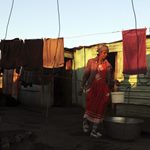| |
|
| |
Data Protection is Social Protection |
| |
|
| |

|
Social-protection programs are supposed to do just what the name implies: protect those segments of society that are most in need. Demanding that beneficiaries effectively renounce their rights to personal privacy and data protection, as many governments are doing, amounts to just the opposite.
In recent decades, social assistance programs around the world have been strengthened to the point that they now benefit more than 2.5 billion people, usually the poorest and most vulnerable. But rising pressure to apply biometric technology to verify beneficiaries’ identities, and to integrate information systems ranging from civil registries to law-enforcement databases, means that social programs could create new risks for those who depend on them.
Private companies, donor agencies, and the World Bank argue that the application of biometric tools like iris and fingerprint scanning or facial and voice recognition, together with the integration of databases, will boost efficiency, combat fraud, and cut costs. And many governments seem convinced. Read the article here and the working paper here |
| |
|
| |
|
| |
Adequacy and sustainability of pension systems in the context of demographic ageing |
| |
|
| |
While many governments and international institutions have framed pension reforms as an inescapable trade-off between adequacy and sustainability, unions insist that addressing the challenges of demographic ageing requires adopting a new overarching narrative, combining greater efforts to support labour market participation of excluded groups, enhanced revenue through progressive and innovative forms of taxation, and the guarantee of a decent income in retirement at the centre of this agenda.
The paper, published by ITUC, reviews several of the measures that States have taken with the intention of improving the sustainability of pension systems and evaluates their effectiveness. The paper highlights that many of the measures taken have had negative distributional impacts and have significantly compromised the primary function of pension systems: to provide a secure replacement income for people in old age and prevent their ability to fall into poverty. Read more |
| |
|
| |
|
| |
Distress or Destitution – why South Africa’s social grants ignore the masses of unemployed |
| |
|
| |

|
It is remarkable that South Africa’s social security laws are still based on the pre-1994 Social Assistance Act, with tweaks. These laws were aimed at the well-being of white South Africans in the context of virtual full employment for white men. They do not accommodate the lifelong income poverty of millions marginalised from decent work.
The catch is that destitution or poverty, while it may be distressing, is not distress, as defined in the act. If you are poor, you are not distressed, but destitute. And for that state of being, there is no income support.
The allocation of social security, the right to social income is guaranteed to all by the Constitution, as entrenched as the right to healthcare, housing, water — and food. But there is no legislated provision for access to social income for poor working-age people, given the fact that the legislation was based on the assumption that apartheid policies virtually guaranteed full employment for the white male breadwinner (with short spells of possible unemployment funded by the Unemployment Insurance Fund). Read more |
| |
|
| |
|
| |
Webinar: Financing gender-responsive social protection |
| |
|
| |
Why do the levels of resources spent on social protection matter to gender equality? How does the social protection financing “mix” (e.g. type of tax, other revenue etc.) matter to women’s outcomes? What are the main challenges, opportunities and initiatives underway on financing gender-responsive social protection?
The webinar will also discuss revenue-expenditure links and the role of gender budgeting initiatives in gender-responsive social protection financing.
Date: 6 June Register here |
| |
|
| |
|
| |
Franciscans International is recruiting UN representative in New York |
| |
|
| |
Franciscans International is looking for a new colleague who will represent them at the United Nations in New York and support their work toward wider respect for human rights, peace, and environmental justice. If this feels like you, please send them an application by 23 June 2019. Read more |
| |
|
